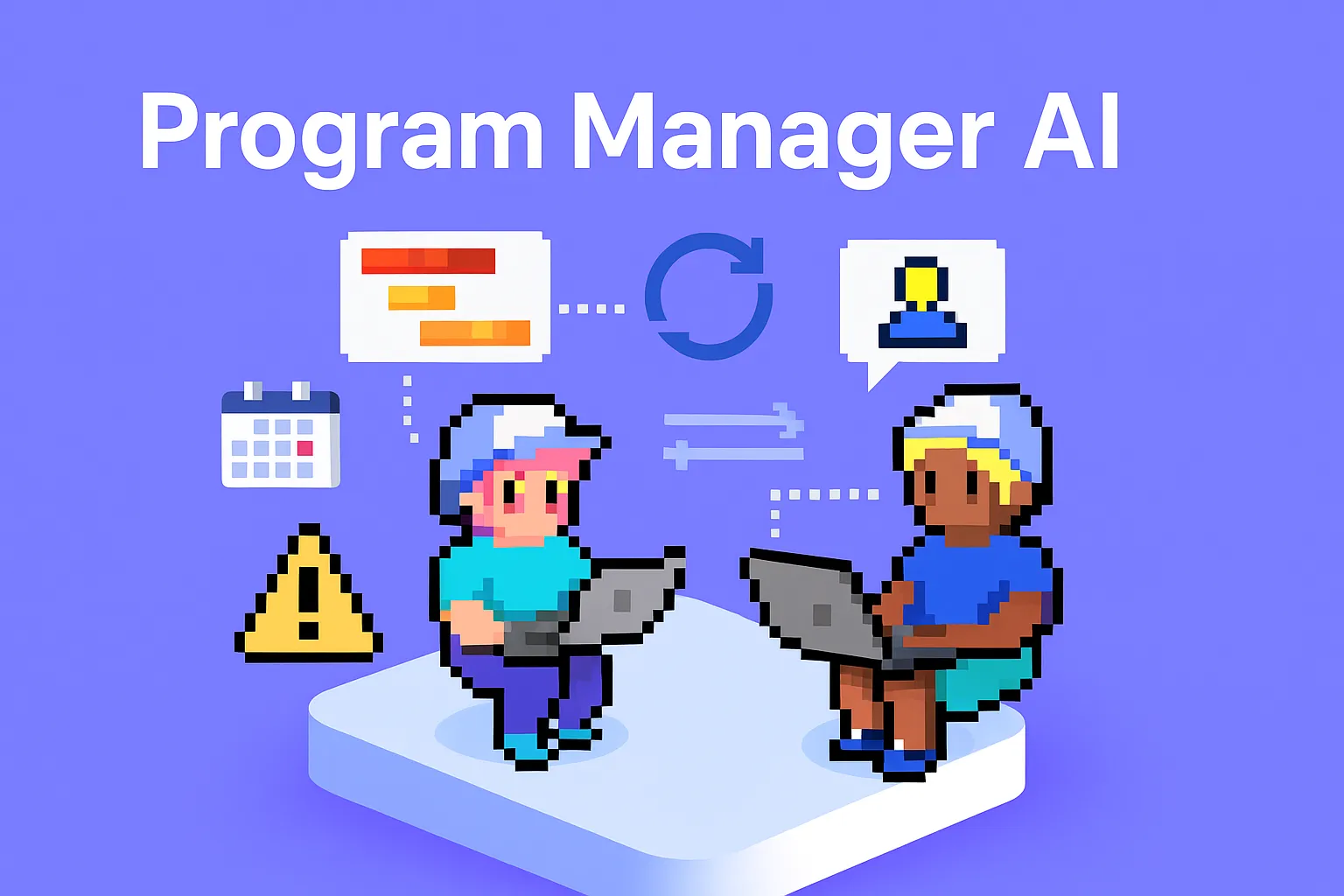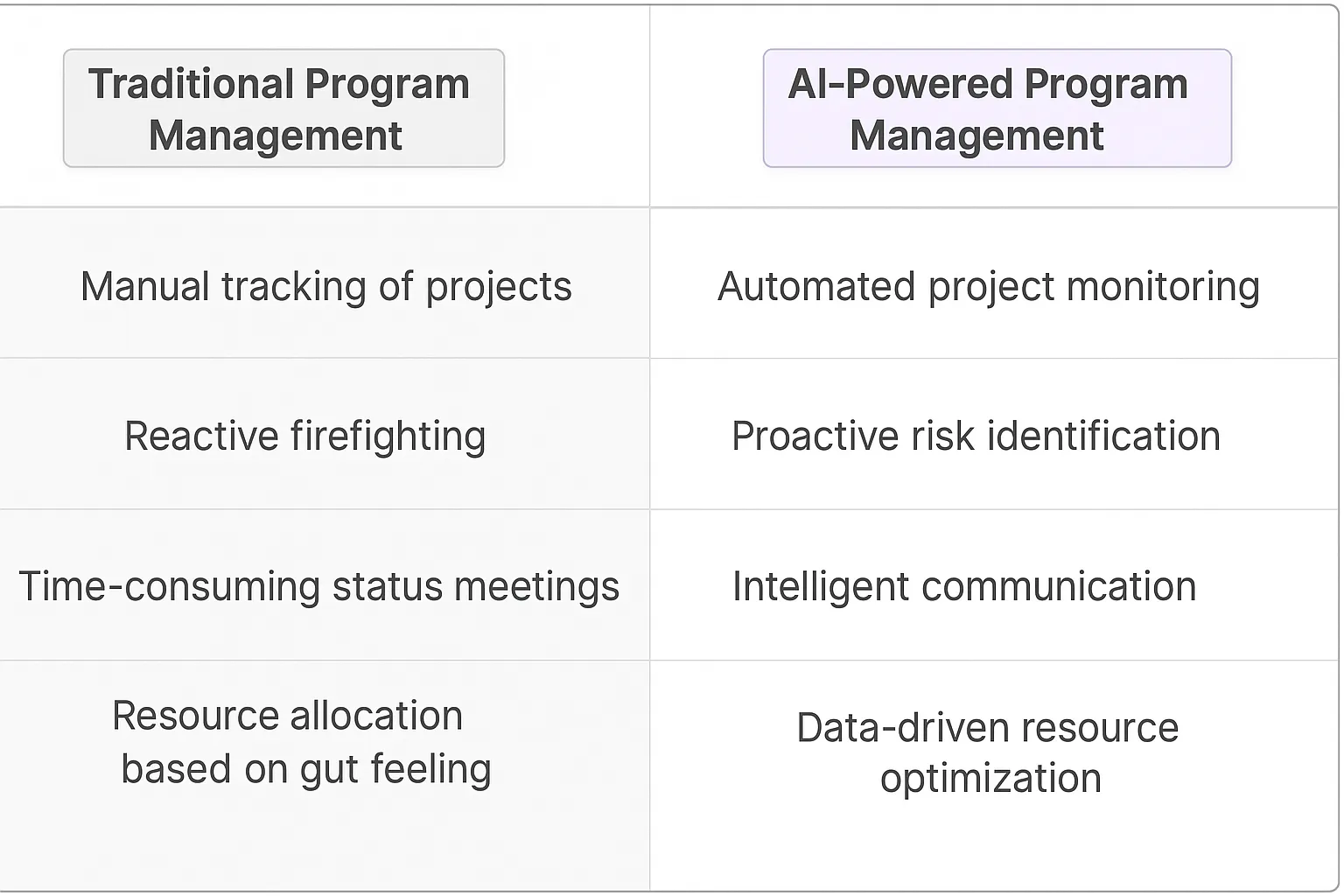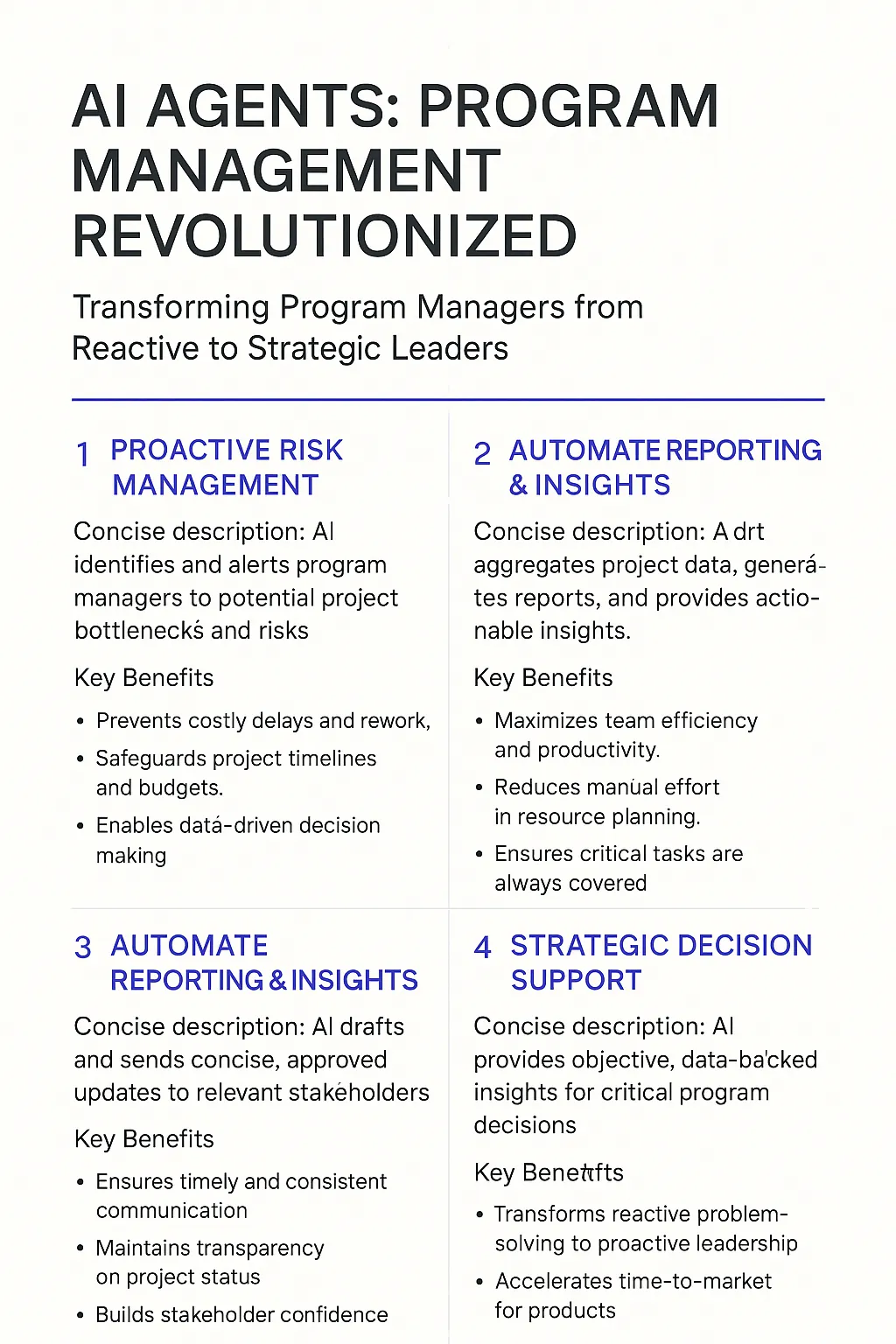Program Manager is a cutting-edge software solution that integrates AI agents into the project management workflow. It's not just another project management tool; it's a paradigm shift in how we approach complex, multi-faceted programs. This system leverages advanced machine learning algorithms to analyze vast amounts of project data, predict potential issues, and optimize resource allocation in real-time.

Before AI agents entered the scene, program managers relied on a hodgepodge of tools and techniques to keep their projects on track. They'd juggle spreadsheets, project management software, and endless email threads. It was like trying to conduct an orchestra with a bunch of mismatched instruments.
The typical workflow involved manually updating task lists, chasing team members for status updates, and spending hours in meetings to align everyone. It was a constant battle against information silos and communication gaps. Program managers often found themselves playing the role of human APIs, translating between different teams and stakeholders.
Enter AI agents, and suddenly program managers have digital teammates that never sleep, never forget, and can process information at superhuman speeds. These AI agents are like having a team of hyper-efficient interns who've somehow absorbed decades of project management wisdom overnight.
First off, AI agents excel at pattern recognition. They can analyze vast amounts of project data and spot trends that human managers might miss. This means potential roadblocks can be identified and addressed before they become full-blown crises. It's like having a crystal ball for your project timeline.
Secondly, these digital teammates are masters of communication. They can automatically generate status reports, send reminders, and even draft emails in the appropriate tone for different stakeholders. This frees up program managers to focus on high-level strategy and relationship building, rather than getting bogged down in administrative tasks.
Another game-changing benefit is the AI agents' ability to optimize resource allocation. By analyzing team members' skills, availability, and past performance, these digital teammates can suggest the most efficient task assignments. It's like having a chess grandmaster planning your every move.
Perhaps most importantly, AI agents bring a level of objectivity to decision-making that's hard for humans to match. They're not influenced by office politics or personal biases. When it comes to tough calls like whether to cut a feature or extend a deadline, AI agents can provide data-driven recommendations that help program managers make more informed decisions.
In essence, AI agents are transforming program managers from firefighters constantly putting out blazes, to strategic leaders who can proactively shape the direction of their projects. It's a shift that's not just changing how projects are managed, but redefining the role of program managers in the modern workplace.

Program managers often find themselves juggling multiple projects, stakeholders, and deadlines. AI agents can step in as digital teammates to enhance their capabilities and efficiency. Let's dive into some concrete ways these AI-powered allies can revolutionize a program manager's workflow:
Beyond high-level processes, AI agents can also tackle specific tasks that often consume a program manager's valuable time:
The integration of AI agents into a program manager's toolkit isn't about replacing human judgment or creativity. Instead, it's about augmenting their capabilities, allowing them to focus on high-value strategic thinking and relationship building. As these AI teammates continue to evolve, we'll likely see a new breed of program managers emerge – ones who are adept at leveraging artificial intelligence to drive unprecedented levels of project success and organizational impact.

Program Manager AI agents are reshaping how we approach complex, multi-faceted projects across industries. These digital teammates aren't just fancy to-do lists; they're becoming indispensable partners in navigating the intricacies of program management. Let's dive into some meaty, industry-specific examples that show how these AI agents are transforming workflows and processes in ways that would make even the most seasoned PMs raise an eyebrow.
From tech startups to Fortune 500 giants, organizations are tapping into the power of AI to tackle challenges that once required armies of human project managers. These AI agents are like having a hyper-intelligent, never-sleeping co-pilot who's always three steps ahead. They're not replacing human creativity and decision-making; they're amplifying it, allowing program managers to focus on high-level strategy while the AI handles the nitty-gritty details.
What's particularly exciting is how these AI agents are adapting to the unique demands of different sectors. Whether it's juggling the moving parts of a software development lifecycle or coordinating massive infrastructure projects, these digital teammates are proving their worth in spades. They're not just following predefined scripts; they're learning, adapting, and sometimes even anticipating issues before they arise.
So, let's roll up our sleeves and explore how Program Manager AI agents are making waves across various industries, shall we? These use cases aren't just theoretical - they're happening right now, and they're changing the game in ways we're only beginning to understand.
The gaming industry is ripe for disruption, and Program Manager AI agents are poised to be the secret weapon. Let's dive into how these digital teammates could reshape the landscape of game development.
Picture a AAA game studio working on the next big open-world RPG. Traditionally, coordinating the efforts of hundreds of developers, artists, and designers is a Herculean task. Enter the Program Manager AI agent.
This AI doesn't just track tasks; it becomes the central nervous system of the entire development process. It analyzes historical data from previous game projects, identifying potential bottlenecks before they occur. By continuously monitoring the progress of each team, it can dynamically reallocate resources, ensuring that character design doesn't fall behind while level designers twiddle their thumbs.
But here's where it gets interesting: the AI agent starts to understand the creative process. It learns that the concept art team tends to hit creative blocks around milestone 3, so it proactively schedules inspiration sessions or brings in guest artists at just the right moment. It notices patterns in bug reports and suggests targeted code reviews in areas that are likely to be problematic.
The real magic happens in its ability to balance the creative vision with practical constraints. When the lead designer wants to add a new feature that would blow the budget, the AI doesn't just say no. It proposes alternative implementations that could achieve a similar player experience within the existing resources.
This isn't about replacing human creativity or decision-making. It's about amplifying it. The Program Manager AI becomes a force multiplier, allowing the human program managers to focus on high-level strategy and nurturing team dynamics.
The result? Games that push the boundaries of what's possible, delivered on time and on budget. It's not just about efficiency; it's about unlocking new realms of creative potential. And in an industry where innovation is the lifeblood, that's the kind of edge that turns good studios into legends.
The construction industry is notoriously slow to adopt new technologies, but that's about to change. Program Manager AI agents are set to disrupt this $10 trillion global market, and the implications are massive.
Consider a large-scale infrastructure project like building a new airport. These projects are infamous for cost overruns and delays. A Program Manager AI agent could be the game-changer here.
This AI doesn't just create Gantt charts; it becomes the project's brain. It ingests data from IoT sensors on equipment, drones surveying the site, and wearables on workers. It then uses this real-time information to optimize resource allocation dynamically.
The AI agent's predictive capabilities are where things get interesting. By analyzing historical data from similar projects worldwide, it can forecast potential issues weeks or months in advance. For example, it might predict supply chain disruptions for steel and suggest alternative sourcing strategies before it becomes a critical problem.
But here's the kicker: the AI starts to understand the nuances of construction. It learns that certain teams work more efficiently in specific weather conditions and adjusts schedules accordingly. It identifies patterns in safety incidents and proactively recommends targeted training or equipment changes.
The AI's ability to balance multiple competing priorities is where it truly shines. When a design change threatens to blow the budget, the AI doesn't just raise a red flag. It proposes alternative approaches that maintain the project's integrity while staying within constraints.
This isn't about replacing human expertise; it's about augmenting it. The Program Manager AI becomes a force multiplier, allowing human managers to focus on stakeholder relationships and complex decision-making.
The result? Infrastructure projects delivered on time, under budget, and with fewer safety incidents. We're talking about shaving years off project timelines and billions off budgets. In an industry where margins are tight and the stakes are high, this kind of efficiency isn't just nice to have—it's transformative.
As this technology matures, we'll see a new breed of construction companies emerge. They'll be leaner, more adaptive, and capable of taking on projects of unprecedented scale and complexity. The winners in this space won't just be building structures; they'll be reshaping skylines and economies.
Implementing a Program Manager AI Agent isn't just about slapping some code together and calling it a day. It's a complex dance of algorithms, data structures, and machine learning models that would make even the most seasoned engineers break a sweat.
First off, we're talking about building an AI that can juggle multiple projects, deadlines, and team dynamics simultaneously. This requires a robust natural language processing system that can understand context, nuance, and even the occasional sarcasm in team communications. It's not just about parsing words; it's about grasping the underlying intent and emotions.
Then there's the challenge of decision-making algorithms. A Program Manager AI needs to prioritize tasks, allocate resources, and make judgment calls that can significantly impact project outcomes. We're not just talking about simple if-then statements here. We need advanced machine learning models that can learn from past projects, adapt to new scenarios, and make decisions that even human managers would find impressive.
Let's not forget about integration. This AI needs to play nice with existing project management tools, communication platforms, and company-specific software. It's like trying to get a group of solo artists to form a cohesive band overnight – possible, but definitely not easy.
On the operational side, we're entering uncharted territory. Introducing an AI Program Manager is like dropping a new species into an ecosystem – it's going to cause ripples, and not everyone's going to be thrilled about it.
First, there's the human factor. Teams accustomed to human managers might resist taking orders from an AI. It's not just about trust; it's about the loss of human connection and the fear of being reduced to mere task-executors. We need to figure out how to make this AI feel like a valuable team member rather than a soulless taskmaster.
Then there's the question of accountability. When things go south (and they will), who takes the fall? The AI? The developers who created it? The executives who green-lit its implementation? We're entering a new frontier of corporate responsibility here, and the legal implications are mind-boggling.
Data privacy is another can of worms. This AI will have access to sensitive project information, employee performance data, and possibly confidential company strategies. Ensuring this data remains secure and compliant with regulations like GDPR isn't just a technical challenge – it's an ongoing operational nightmare.
Lastly, we can't ignore the cultural shift. Implementing an AI Program Manager isn't just a technological change; it's a fundamental reimagining of how work gets done. It requires a massive change management effort, from redefining roles and responsibilities to establishing new communication protocols. It's like trying to teach an entire organization to write with their non-dominant hand – possible, but expect a lot of messy handwriting along the way.
The integration of AI agents into program management isn't just a technological upgrade; it's a fundamental reimagining of how complex projects are executed. As we've seen across industries from game development to construction, these digital teammates are unlocking new levels of efficiency and innovation.
However, the road ahead isn't without challenges. Technical hurdles like developing sophisticated NLP systems and decision-making algorithms need to be overcome. Operationally, organizations must navigate the cultural shift and address concerns around accountability and data privacy.
Despite these challenges, the potential benefits are too significant to ignore. Program Manager AI agents are poised to create a new breed of hyper-efficient, data-driven project execution. As this technology matures, we'll likely see a widening gap between organizations that embrace these AI teammates and those that don't.
The future of program management is here, and it's powered by AI. Those who adapt quickly will find themselves at the forefront of a new era of project execution, capable of tackling challenges of unprecedented scale and complexity. The question isn't whether AI will transform program management, but how quickly organizations will seize this opportunity to redefine what's possible in their respective fields.